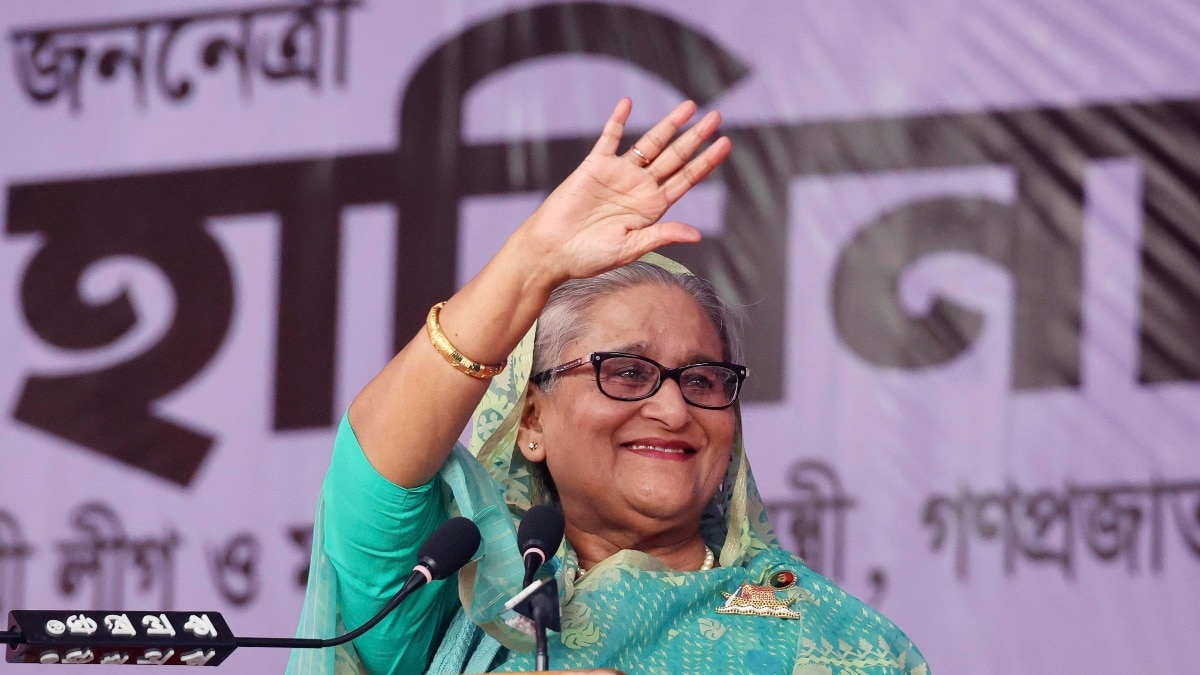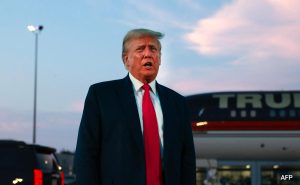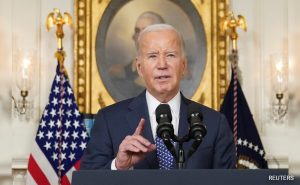2024-01-08 04:04:21
“Prime Minister Sheikh Hasina is the only player in the entire political playground of Bangladesh. She has no competitor,” Swadesh Roy, senior journalist and author, tells IndiaToday.In from Dhaka.
Election results were still trickling in on Sunday night as Roy tried to sum up the situation on a phone call. Everyone knew the election that was boycotted by the main opposition party — the Bangladesh Nationalist Party (BNP) — would spring no surprise.
The result was on expected lines — Sheikh Hasina has secured a fourth straight term as the Prime Minister of Bangladesh. She has become the longest-serving leader of Bangladesh.
What is interesting is how Sheikh Hasina, who was brought by Awami League veterans just to be a figurehead and unify the party founded by her father Sheikh Mujibur Rahman not only managed to have a controlling grip on the party, but also got all political opposition out of her way.
Bangladesh experts see an uncanny parallel between Sheikh Hasina’s and former Indian Prime Minister Indira Gandhi’s political journey. Like Congress veteran K Kamaraj brought in Indira Gandhi as a “puppet leader”, Awami League veterans also had similar plans for Hasina.
“There were splits in the Awami League and the veterans planned to stay in power by bringing her back and placing her as a dummy head. But she grew to become its biggest leader,” Muntassir Mamoon, Bangabandhu Chair of Chittagong University, tells IndiaToday.In.
HASINA’S JOURNEY TO CONSOLIDATING POWER
It was 1981 and Hasina was in India. She had sought refuge and spent six years in India after the 1975 assassination of her father Mujibur Rahman and other family members. That was when her fight as an opposition leader started. Hasina fought for democracy, something that her critics and the western press now accuse her of suppressing.
By the time Bangladesh went to the polls on January 7, over 27,000 leaders and activists of the opposition BNP were rounded up and over 1,700 were jailed in political cases in two months, according to The Daily Star. For all practical purposes, Bangladesh has become a one-party nation, say Hasina’s critics.
After a 15-year-long fight, during which she was arrested multiple times, Sheikh Hasina led the Awami League to power in 1996. She again formed the government after winning the election in 2008, and accumulated power by winning all the subsequent elections till date.
There is a stark difference between the Sheikh Hasina of 1996 and the one of 2024, according to her critics and opponents.
“Sheikh Hasina, in 1996, was the leader of a party that didn’t have a clear majority in Parliament, with 140 seats, while the BNP had 116 seats. So, it was difficult to use Parliament as a rubber stamp and corrupt the judiciary, police, and administration,” AKM Wahiduzzaman, information and technology affairs secretary of Bangladesh Nationalist Party (BNP), tells IndiaToday.In.
“In 2023, due to the brute majority in Parliament that she has been enjoying since 2009, thanks to her deal with then Bangladesh Army chief Moeen U Ahmed, she has practically converted the Parliament into a rubber stamp and used that to corrupt the judiciary and the executive division to gradually establish an autocratic government,” says Wahiduzzaman.
“The matter is not her leadership style, but the situation that allowed her to create a one-party state,” adds the BNP functionary who is in exile in Malaysia.
‘HASINA NOT AN AUTHORITARIAN, BUT A STALWART’
Senior journalist Swadesh Roy says people might see an authoritarian face, but Sheikh Hasina needs to secure power for the betterment of her people.
“Sheikh Hasina isn’t an authoritarian leader; she is a stalwart, a towering figure. That’s why some might perceive her as an authoritarian leader,” he says.
Sheikh Hasina has had to rule with an iron fist to tackle the Islamist radicals and the pro-Pakistani disruptors in Bangladesh, say her backers.
“She has prevented Islamic militancy from growing in Bangladesh by showing a zero-tolerance policy towards extremists,” says Muntassir Mamoon.
Hasina is the only option for a safe and stable Bangladesh, according to him.
Smruti Pattnaik of Manohar Parrikar Institute for Defence Studies and Analyses (IDSA) agrees that Hasina has delivered in terms of zero-tolerance for terrorism.
“Domestically, she has fought against radical terror groups that were behind the most heinous attacks in Bangladesh. Some of these groups are networked with Indian radical groups,” she tells IndiaToday.In.
Hasina’s fight has benefited India tremendously.
“After her election in 2008, Hasina made it sure that Indian insurgents given shelter by the previous BNP regime were made to leave Bangladesh and surrender to India. This facilitated peace talks that India held with insurgents subsequently,” says Pattanaik.
Hasina’s supporters say if not for her, there would be chaos, lawlessness and strife. This was evident from the violence seen on the eve of the polls in Bangladesh.
HOW SHEIKH HASINA MADE OPPOSITION ‘IRRELEVANT’
BNP’s Wahiduzzaman says “Sheikh Hasina inherited a repressive state from then Army chief Moeen U Ahmed and followed his playbook of depoliticization”. He says the January 7 elections “is the foundation stone of a totalitarian Bangladesh”.
“Every stakeholder, including the trade partners, should realize the fact that she has left no space for anyone who can challenge her rule and has sealed all the democratic ways to replace her regime,” adds Wahiduzzaman.
Swadesh Roy and Muntassir Mamoon credit masterstrokes by Hasina for giving her an unchallenged leadership and making the opposition in Bangladesh irrelevant, at least for now.
“Sheikh Hasina has successfully balanced the democratic and the autocratic world. It is hard to believe but India, China, Russia, Japan and several other countries that have varying interests are all her friends,” says Roy.
According to Roy, Hasina won domestic politics through international relations.
If Russia is setting up a nuclear power plant in Bangladesh and providing it with uranium, China is financing infrastructure projects. India, too, is involved in several projects with its neighbour that it helped liberate in 1971 by defeating the Pakistani military. Bangladesh also has excellent ties with Japan, Turkey and Saudi Arabia.
Interestingly, rivals India and China were in the same pro-Hasina camp while the US was trying to prop up BNP leader Khaleda Zia. “Hasina has kept both India and China in good humour. She has engaged them in various infrastructure projects,” says IDSA’s Smruti Pattanaik.
“Hasina smartly played her international diplomacy cards while her opponents remained stuck in the 1980s and 1990s and couldn’t understand the present situation. They couldn’t play any smart cards and were outwitted,” explains Swadesh Roy.
Political science expert Muntassir Mamoon says the unprecedented development that Hasina brought during her regime has been the game-changer. He points to the highways, bridges, ports and the metro rail project.
“Hasina has lifted millions out of poverty. Through her Ashrayan scheme, she has provided houses and a small amount of capital to over five lakh people,” says Mamoon. “Despite a decrease in cultivable land, Bangladesh has taken huge strides towards self-sufficiency in foodgrain production. Hasina’s regime hasn’t seen even a single famine, and we are on our way to eradicate hunger from Bangladesh,” he adds.
Mamoon says that it is the pro-business, pro-poor and development-oriented governance that has won Sheikh Hasina domestic support and made the Opposition irrelevant.
SHEIKH HASINA AND BANGLADESHI PRIDE
The septuagenarian Muntasir Mamoon beams with pride when he speaks about how a small country like Bangladesh has accommodated about one crore Rohingya refugees from Myanmar.
More than anything else, it seems it is the Bengali pride that the Sheikh Hasina government has brought in the citizens of Bangladesh that matters to people like Mamoon.
“In the 70s and 80s, when we went with our green passports, we were humiliated and harassed at immigration centres. Now, I am a proud holder of a green passport. I am a proud Bengali and a proud citizen of Bangladesh. I have no inferiority complex, all thanks to Sheikh Hasina,” asserts Muntassir Mamoon.
Bangladesh election 2024, Bangladesh elections, Bangladesh news, Bangladesh PM, Bangladesh general election, sheikh hasina father, how powerful is sheikh hasina
Source link
![]()



